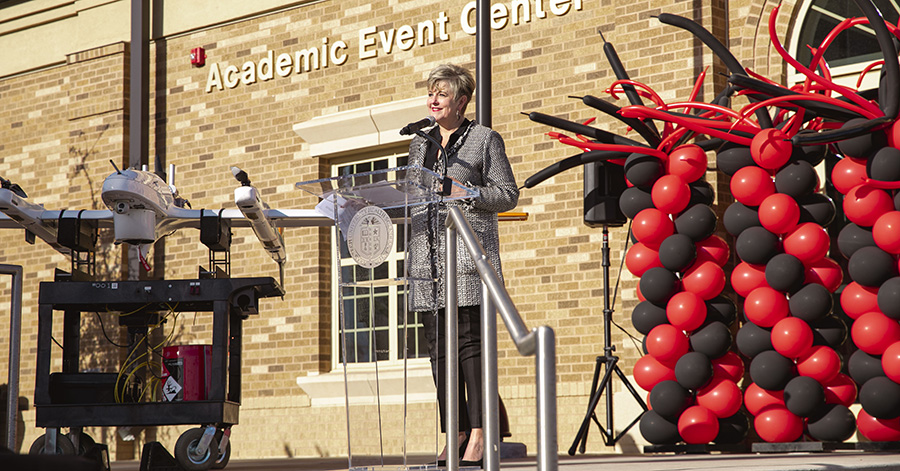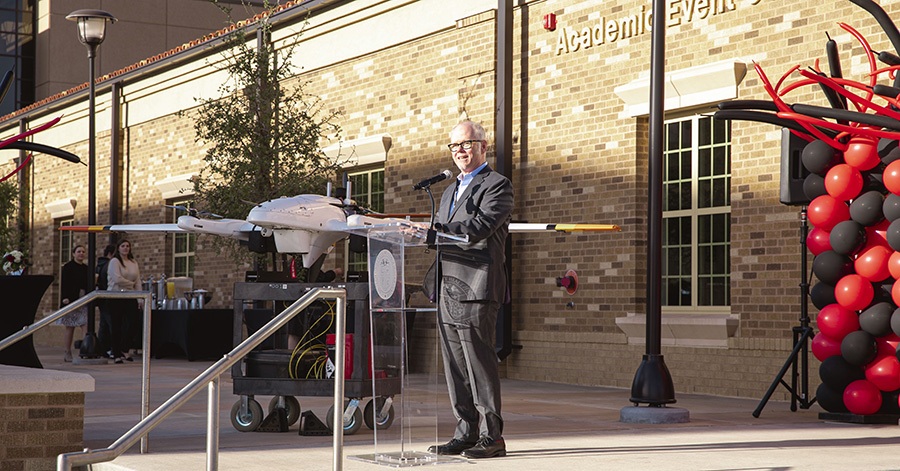Bridging Academia and Industry to Advance Drone Technologies
TTUHSC Hosts Matador UAS Consortium Summit on Campus

President Lori Rice-Spearman, Ph.D.
Texas Tech University Health Sciences Center (TTUHSC), in conjunction with Texas Tech University and 2THEDGE, a leading technology consulting and investing firm, unveiled the groundwork of a future public-private collaboration supporting the advancement of Unmanned Aerial Systems (UAS) research at a summit event on the TTUHSC campus Wednesday, April 6.
The proposed Matador UAS Consortium would feature a collaborative effort among several regional commercial, educational and non-profit entities, including TTUHSC, Texas Tech University, South Plains College, LifeGift — an organ and tissue donation agency that serves Lubbock and Amarillo — and additional organizations that together will combine their expertise to innovate and advance the operational and technical capabilities of UAS technology across West Texas and the South Plains region.
An early focus of the Matador Consortium will aim to harness UAS technology to innovate rural health care services, specifically in the area of safe and rapid organ and tissue procurement for lifesaving treatments and research in collaboration with LifeGift.
“Our collaboration with LifeGift is an example of the transformative health care that we envision for this region and across the state,” said TTUHSC President Lori Rice-Spearman, Ph.D. “UAS technology combined with our efforts in telehealth and telemedicine is truly an innovative approach to expanding access to quality health care in rural, underserved areas. Leading this summit with key stakeholders at the table was an opportunity to explore the vast applications in health care for UAS and identify strategic next steps toward developing a comprehensive initiative.”
The Matador UAS Consortium originated from discussions between current foundational collaborators seeking to improve organ procurement for rural areas by harnessing and deploying UAS and drone technology.
Currently, there are 110,000 people –13,000 in Texas – in need of lifesaving transplants.
According to the Organ Procurement and Transplantation Network, donated organs require
special methods of preservation to remain viable between the time of procurement and
transplantation.
To remain viable, common maximum organ preservation times include:
- Heart, lung: 4-6 hours
- Liver: 8-12 hours
- Pancreas: 12-18 hours
- Kidney: 24-36 hours

Associate Dean of Research Phil Sizer, PT, Ph.D.
“The use of drone transportation of organs and associated tissues is a critically important mode of transportation to facilitate faster and more reliable movement of organs for transplant, especially in rural areas such as West Texas and neighboring areas,” LifeGift President and Chief Executive Officer Kevin Myer said.
The Matador UAS Consortium will feature a team of world-class UAS enterprises, university research departments, and U.S. government agencies, that are actively pushing the boundaries of Beyond Visual Line of Sight drone transport using pipeline, electrical, transmission and railroad corridors for uninterrupted flights to remote locations – to conduct proof-of-concept research into the safe UAS organ transport of tissues, organs health care supplies and medicines.
"The Matador UAS Consortium will leverage our commercial partner's Beyond Visual Line of Sight (BVLOS) expertise to create an extensive network of UAS corridors across West Texas,” 2THEDGE Founder and Chief of Technology Reconnaissance, Tyson Harmon, said. “These corridors will facilitate safe and commercially viable UAS operations starting with health care and growing to encompass other business use cases."
The Matador UAS Consortium research aims to mitigate risks to biological materials and streamline organ transfer through efficient use of drones in dedicated flight corridors that are not heavily impacted by conventional air traffic limitations. This will be accompanied by creating new packaging and containers for safe UAS cargo transport.
“This is truly a signature moment in the formation and launch of the Matador UAS Consortium,” said TTUHSC Associate VP of Research & Innovation, Phil Sizer, Ph.D. “The united presence of these organizations at today’s summit signals a commitment to advancing UAS technology and research for the benefit of West Texas and the South Plains region.”
The consortium also plans to utilize its collaborative insights to harness drone technology for search, rescue and transport and recovery services; crop management; rural health care for underserved communities; large animal sample transport; renewable energy infrastructure; herd management; and drone technology and operations job training.
Related Stories
TTUHSC Cancer Researcher Honored by National Academy of Inventors
C. Patrick Reynolds, M.D., Ph.D., director of the School of Medicine Pediatric Cancer Research Center at TTUHSC, has dedicated his life as a researcher to developing treatments for childhood cancers.
TTUHSC’s Hudson Set to Serve as President for Society of Clinical Research Associates
The Society of Clinical Research Associates (SOCRA) has elected Texas Tech University Health Sciences Center’s (TTUHSC) Catherine Hudson, Dr.P.H., as its president for 2025-2026.
Clinical Research Institute a Source of Pride for Retiring Griswold
Upon his retirement, John Griswold, M.D., reflects on the Clinical Research Institute and what it has achieved.
Recent Stories
The John Wayne Cancer Foundation Surgical Oncology Fellowship Program at Texas Tech University Health Sciences Center Announced
TTUHSC is collaborating with the John Wayne Cancer Foundation and has established the Big Cure Endowment, which supports the university’s efforts to reduce cancer incidence and increase survivability of people in rural and underserved areas.
TTUHSC Receives $1 Million Gift from Amarillo National Bank to Expand and Enhance Pediatric Care in the Panhandle
TTUHSC School of Medicine leaders accepted a $1 million philanthropic gift from Amarillo National Bank on Tuesday (Feb. 10), marking a transformational investment in pediatric care for the Texas Panhandle.
Texas Tech University Health Sciences Center Permian Basin Announces Pediatric Residency Program Gift
TTUHSC Permian Basin, along with the Permian Strategic Partnership and the Scharbauer Foundation, Feb. 5 announced a gift that will fund a new pediatric residency.
